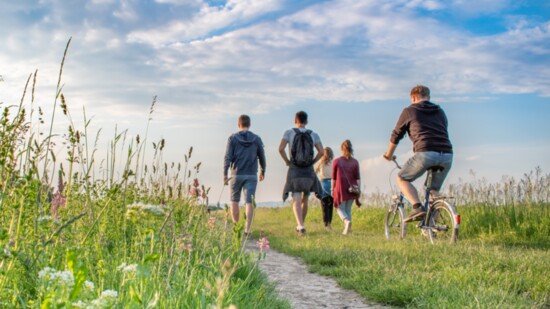COVID restrictions lifted combined with long warm days, open businesses, recreational activities and the chance to finally see long missed friends and family offers hope and excitement to many. Additionally, many parents are breathing a sigh of relief knowing they will get to resign their jobs as remote teachers, coaches and entertainers, and finally say yes to playdates and birthday parties in the near future if they haven’t already.
But not everyone is feeling unabashed joy and a sense of freedom. As cities and states move towards full re-opening, many people feel unsettled, anxious and let us not forget, some are still grieving loved ones and reeling from the systemic trauma of a killer we couldn’t see or predict. The news reminds us that many people in the world are still suffering unimaginable pain and fear. We can’t help and shouldn’t turn away from the images and reports from India, Malesia and other countries, which are heartbreaking. We can’t avoid hearing of the contradictory advice by leaders in science, governments and even sports associations. As an example, the controversy over if the Olympics should be held. No wonder why anxiety is ever present.
If we are lucky, we are feeling a chance to live more normally. But at the same time, some feel resentful watching others make different decisions. To say the least, many of us don’t feel confident in the world around us or how to be with others. And it never feels good to be suspicious, untrusting, fearful, angry, sad, jealous, anxious, sad or depressed, especially while other seem to be celebrating and partying.
I used to say to people “I can’t wait till I can hug someone and not have to let go.” But I still am unsure if I am supposed to wear a mask, shake a hand or hug a friend. I am unsure how close proximity to me will be viewed by others. Will I intimidate someone or make them uneasy if I reach out or don’t?
The American Psychological Association reports that Americans are experiencing the highest levels of stress since April 2020, and that half of surveyed adults are uneasy about returning to in-person interactions.
Additionally, re-entering the busy world offers a new type of stress. Navigating day to day things like traffic, parking, invitations, commuting, sporting events or going to the movies can leave you feeling overstimulated and exhausted.
There’s no right or wrong way to handle re-entry, but experts suggest in general to communicate, go at your own pace and take small steps to build resilience. Elaborating on expert advice are the following suggestions:
Give yourself permission to feel anxious. Anxiety is commonly experienced in the form of fear, nervousness, worry or dread. Understand that your feelings are natural, normal and shared by many. In fact, WebMD shows that 26% of Americans felt a sense of trauma from COVID, 25% are afraid to go to the store and 15% are afraid to leave their homes. Trauma is fear that remains with us long after safety has been established. We feel insecure about our decisions and what to do. If you are experiencing this, please seek professional help.
Communicate, early and often. Try not to be embarrassed to share your needs or discomfort. Perhaps saying something like “I’m taking this slow, and I am so used to space. I still feel better with my mask on and social distancing.” This is pretty acceptable statement and hopefully whatever you say, you will be met with empathy and understanding.
Take your time. Evaluate and adjust your comfort levels. Start small and with those you are at ease with and trust. Have a friend over or grab socially distanced coffee someone outside. If inside, consider starting the interaction with the window open and the fan on. Maybe after 10 minutes, you turn the fan off or close the window. With each new encounter you will build confidence and resilience.
Build new routines one at a time.
Practice mindfulness. Mindfulness involves non-judgmental attention to and awareness of the present moment. Mindfulness practice like breathing exercises can help reduce anxiety symptoms and enhance emotional well.
Engage in something fulfilling. This can provide a sense of accomplishment and satisfaction. Consider calling someone you love or make a point to do something you have had on your mind. Perhaps take a daily walk or put flowers around your house. The quickest fix for a change in mood is to do something for someone else.
Practice gratitude. Gratitude based interventions can be helpful for anxiety. When plans seem to go awry, write down things you are grateful for as a valuable exercise to offer a bigger picture perspective.
Exercise and sleep. Get out and get some exercise. It can go a long way in improving physical as well as mental health. Then get a good night’s sleep. Problematic sleep can increase risk of anxiety, depression and emotional dysregulation. Have a regular bedtime, avoid screens and limit caffeinated drinks.
Try and understand that people have their reasons for transitioning the way that works for them. We’re re-entering a different world, with new rules and we are coming from different pandemic experiences.
If you find that re-entry is destabilizing, you do not feel like yourself, cannot handle regular daily activities then it’s time to seek professional help. There are effective, evidence based treatments for anxiety. Professional help is much more accessible nowadays through telemedicine. And don’t settle for just anyone. You are the consumer. You must feel comfortable and able to connect. If you don’t like the first person you speak with, find someone else. Don’t waste precious time and treasure. Know you are worth it.
Ginny Gray, LCSW
Addiction and Trauma Specialist: Certified in EMDR
Hand in Hand Counseling
HandinHandCounselingCT.Com
203-249-3042
